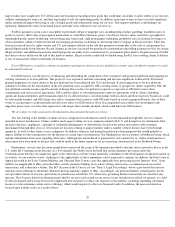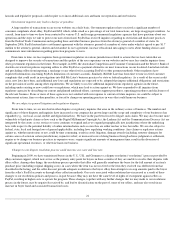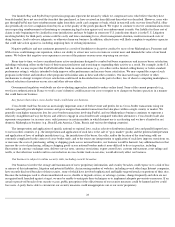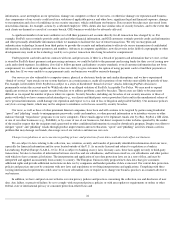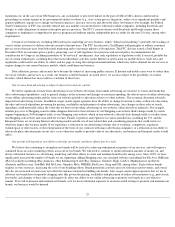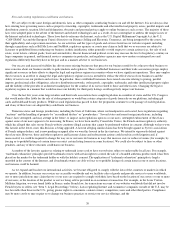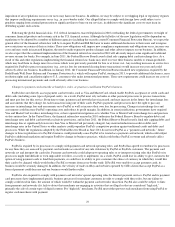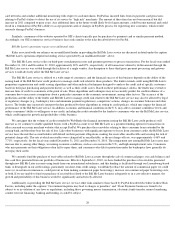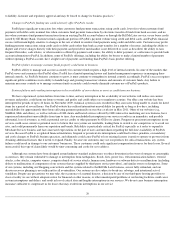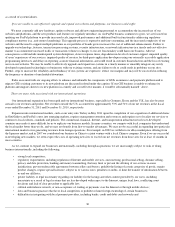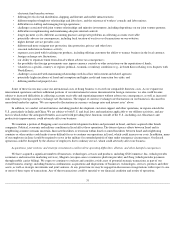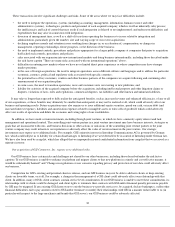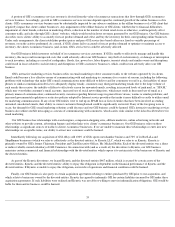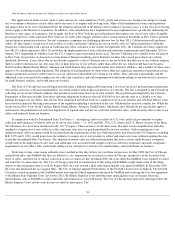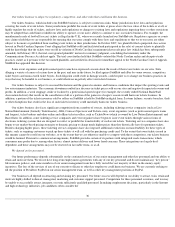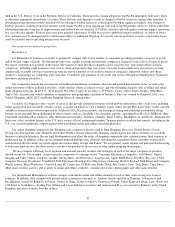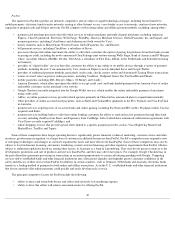eBay 2011 Annual Report Download - page 35
Download and view the complete annual report
Please find page 35 of the 2011 eBay annual report below. You can navigate through the pages in the report by either clicking on the pages listed below, or by using the keyword search tool below to find specific information within the annual report.
as a result of system failures.
If we are unable to cost-effectively upgrade and expand our websites and platforms, our business would suffer.
We must constantly add new hardware, update software and add new engineering personnel to accommodate the increased use of our
websites and platforms, and the new products and features we regularly introduce. As our PayPal business continues to grow, we are focused on
updating our PayPal platform to provide increased scale, improved performance and additional built-in functionality addressing regulatory
compliance matters (e.g., anti-money laundering). This upgrade process is expensive and time-consuming, and the increased complexity of our
websites and the need to support multiple platforms as our portfolio of brands grows increases the cost of additional enhancements. Failure to
upgrade our technology, features, transaction processing systems, security infrastructure, or network infrastructure in a timely and cost-effective
manner to accommodate increased traffic or transaction volume or changes to our site functionality could harm our business. Adverse
consequences could include unanticipated system disruptions, slower response times, degradation in levels of customer support, impaired quality
of users' experiences of our services, impaired quality of services for third-party application developers using our externally accessible application
programming interfaces and delays in reporting accurate financial information, and could result in customer dissatisfaction and the loss of existing
users on our websites. We may be unable to effectively upgrade and expand our systems in a timely manner or smoothly integrate any newly
developed or purchased technologies or businesses with our existing systems, and any failure to do so could result in problems on our sites.
Further, steps to increase the reliability and redundancy of our systems are expensive, reduce our margins and may not be successful in reducing
the frequency or duration of unscheduled downtime.
Risks associated with our ongoing efforts to enhance and unbundle the components of GSI's ecommerce and payments platform and to
migrate GSI's existing customers to its new platform are discussed in detail under the caption “If our GSI business is unable to enhance its
platform and migrate clients to its new platform in a timely and cost-effective manner, it would be substantially harmed” above.
There are many risks associated with our international operations.
Our international expansion has been rapid and our international business, especially in Germany, Korea and the U.K., has also become
critical to our revenues and profits. Net revenues outside the U.S. accounted for approximately 53% and 54% of our net revenues in the fiscal
years ended December 31, 2011 and December 31, 2010, respectively.
Expansion into international markets, such as our entry into Turkey in May 2011 upon the completion of our acquisition of additional shares
in GittiGidiyor and PayPal's entry into emerging markets, requires management attention and resources and requires us to localize our services to
conform to local cultures, standards and policies. The commercial, financial, Internet, and transportation infrastructure in lesser-developed
countries may make it more difficult for us to replicate our business models. In many countries, we compete with local companies that understand
the local market better than we do, and we may not benefit from first-to-
market advantages. We may not be successful in expanding into particular
international markets or in generating revenues from foreign operations. For example, in 2002 we withdrew our eBay marketplace offering from
the Japanese market, and in 2007 we contributed our business in China to a joint venture with a local Chinese company. Even if we are successful
in developing new markets, we often expect the costs of operating new sites to exceed our net revenues from those sites for at least 12 months in
most countries.
As we continue to expand our businesses internationally, including through acquisitions, we are increasingly subject to risks of doing
business internationally, including the following:
30
•
strong local competitors;
• regulatory requirements, including regulation of Internet and mobile services, auctioneering, professional selling, distance selling,
privacy and data protection, banking and money transmitting, that may limit or prevent the offering of our services in some
jurisdictions, prevent enforceable agreements between sellers and buyers, prohibit the listing of certain categories of goods, require
product changes, require special licensure, subject us to various taxes, penalties or audits, or limit the transfer of information between
us and our affiliates;
• greater liability or legal uncertainty regarding our liability for the listings and other content provided by our users, including
uncertainty as a result of legal systems that are less developed with respect to the Internet, unique local laws, conflicting court
decisions and lack of clear precedent or applicable law;
• cultural ambivalence towards, or non-
acceptance of, trading or payments over the Internet or through mobile devices;
•
laws and business practices that favor local competitors or prohibit or limit foreign ownership of certain businesses;
•
difficulties in integrating with local payment providers, including banks, credit and debit card networks and


